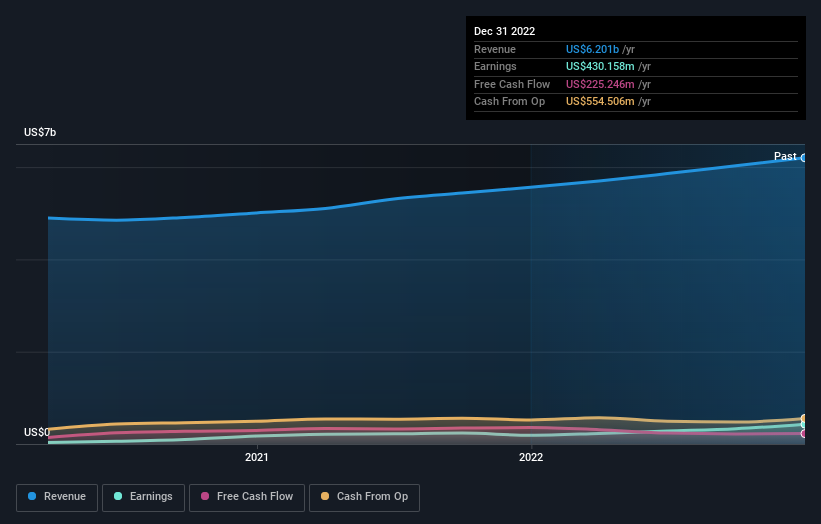Coca-Cola Consolidated, Inc.'s (NASDAQ:COKE) one-year returns climbed after last week's 4.1% gain, institutional investors must be happy
Key Insights
Significantly high institutional ownership implies Coca-Cola Consolidated's stock price is sensitive to their trading actions
A total of 5 investors have a majority stake in the company with 56% ownership
A look at the shareholders of Coca-Cola Consolidated, Inc. (NASDAQ:COKE) can tell us which group is most powerful. We can see that institutions own the lion's share in the company with 38% ownership. That is, the group stands to benefit the most if the stock rises (or lose the most if there is a downturn).
And last week, institutional investors ended up benefitting the most after the company hit US$5.0b in market cap. The gains from last week would have further boosted the one-year return to shareholders which currently stand at 8.9%.
In the chart below, we zoom in on the different ownership groups of Coca-Cola Consolidated.
Check out our latest analysis for Coca-Cola Consolidated
What Does The Institutional Ownership Tell Us About Coca-Cola Consolidated?
Many institutions measure their performance against an index that approximates the local market. So they usually pay more attention to companies that are included in major indices.
Coca-Cola Consolidated already has institutions on the share registry. Indeed, they own a respectable stake in the company. This implies the analysts working for those institutions have looked at the stock and they like it. But just like anyone else, they could be wrong. It is not uncommon to see a big share price drop if two large institutional investors try to sell out of a stock at the same time. So it is worth checking the past earnings trajectory of Coca-Cola Consolidated, (below). Of course, keep in mind that there are other factors to consider, too.
Hedge funds don't have many shares in Coca-Cola Consolidated. The Coca-Cola Company is currently the company's largest shareholder with 26% of shares outstanding. J. Harrison is the second largest shareholder owning 11% of common stock, and Sue Anne Wells holds about 6.4% of the company stock. J. Harrison, who is the second-largest shareholder, also happens to hold the title of Chief Executive Officer.
To make our study more interesting, we found that the top 5 shareholders control more than half of the company which implies that this group has considerable sway over the company's decision-making.
Researching institutional ownership is a good way to gauge and filter a stock's expected performance. The same can be achieved by studying analyst sentiments. As far as we can tell there isn't analyst coverage of the company, so it is probably flying under the radar.
Insider Ownership Of Coca-Cola Consolidated
The definition of company insiders can be subjective and does vary between jurisdictions. Our data reflects individual insiders, capturing board members at the very least. The company management answer to the board and the latter should represent the interests of shareholders. Notably, sometimes top-level managers are on the board themselves.
Most consider insider ownership a positive because it can indicate the board is well aligned with other shareholders. However, on some occasions too much power is concentrated within this group.
Our information suggests that insiders maintain a significant holding in Coca-Cola Consolidated, Inc.. It has a market capitalization of just US$5.0b, and insiders have US$1.2b worth of shares in their own names. That's quite significant. Most would be pleased to see the board is investing alongside them. You may wish to access this free chart showing recent trading by insiders.
General Public Ownership
The general public, who are usually individual investors, hold a 12% stake in Coca-Cola Consolidated. While this size of ownership may not be enough to sway a policy decision in their favour, they can still make a collective impact on company policies.
Public Company Ownership
It appears to us that public companies own 26% of Coca-Cola Consolidated. We can't be certain but it is quite possible this is a strategic stake. The businesses may be similar, or work together.
Next Steps:
While it is well worth considering the different groups that own a company, there are other factors that are even more important.
I like to dive deeper into how a company has performed in the past. You can find historic revenue and earnings in this detailed graph.
Of course this may not be the best stock to buy. So take a peek at this free free list of interesting companies.
NB: Figures in this article are calculated using data from the last twelve months, which refer to the 12-month period ending on the last date of the month the financial statement is dated. This may not be consistent with full year annual report figures.
Have feedback on this article? Concerned about the content? Get in touch with us directly. Alternatively, email editorial-team (at) simplywallst.com.
This article by Simply Wall St is general in nature. We provide commentary based on historical data and analyst forecasts only using an unbiased methodology and our articles are not intended to be financial advice. It does not constitute a recommendation to buy or sell any stock, and does not take account of your objectives, or your financial situation. We aim to bring you long-term focused analysis driven by fundamental data. Note that our analysis may not factor in the latest price-sensitive company announcements or qualitative material. Simply Wall St has no position in any stocks mentioned.
Join A Paid User Research Session
You’ll receive a US$30 Amazon Gift card for 1 hour of your time while helping us build better investing tools for the individual investors like yourself. Sign up here

 Yahoo Finance
Yahoo Finance 

